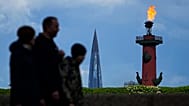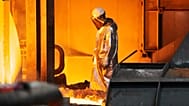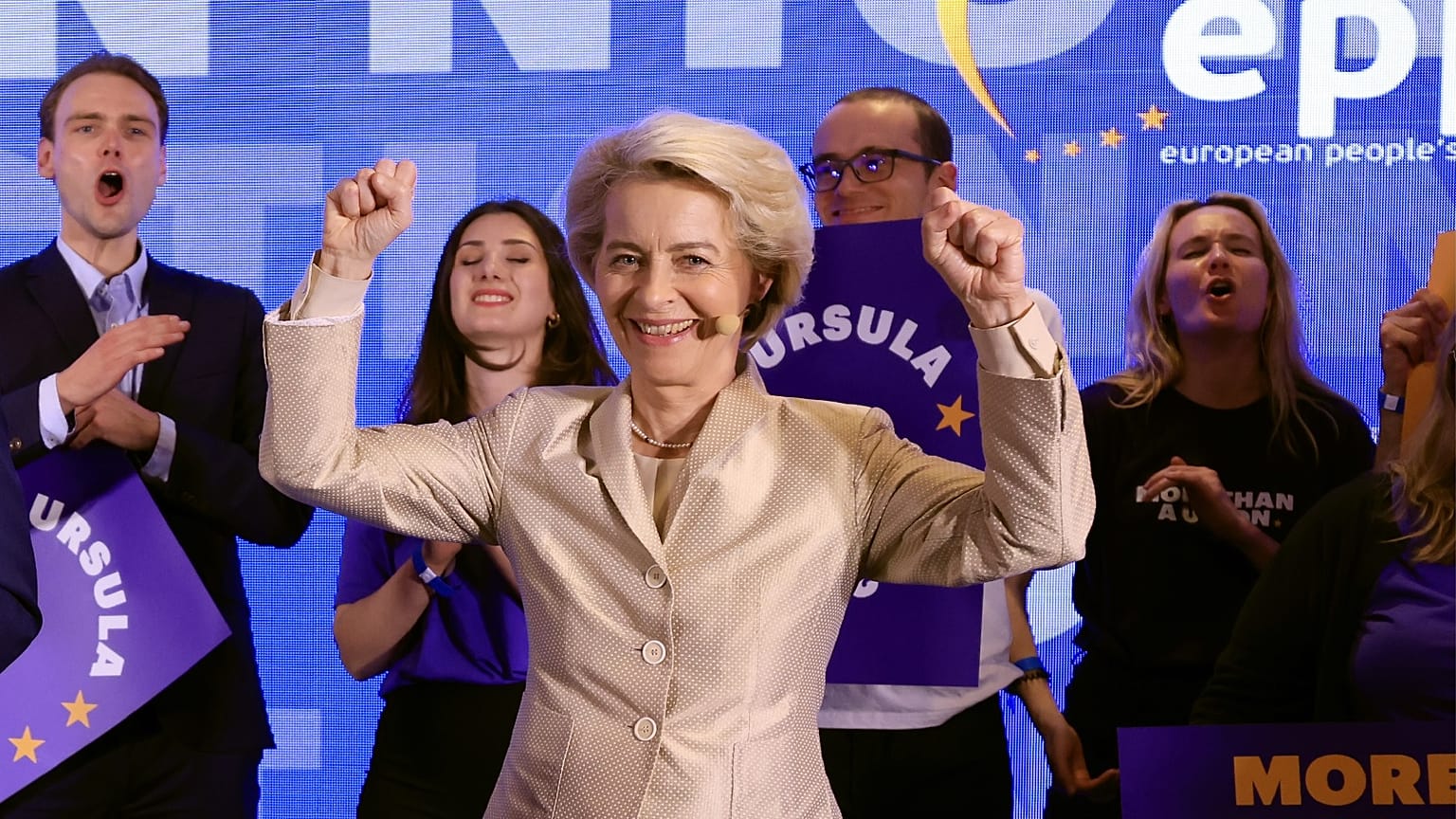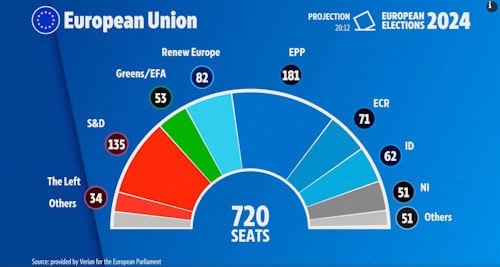Euronews brings you the latest news and analysis as the results roll in on the fourth and final day of the European elections. Snap election called by French President Emmanuel Macron in response to trouncing by Le Pen's far-right.
 ADVERTISEMENT
ADVERTISEMENT
Exit polls are now coming in thick and fast, and a first estimate of election results produced by the European Parliament sees the Green and liberal Renew parties each losing around 20 MEPs each and the EPP holding up its support, despite a swing to the right, if less than expected.
The elections which unfolded over four days is the world’s biggest trans-national ballot with some 360 million EU citizens urged to cast their votes to elect 720 members of the European Parliament.
Italy will be the last country to close its ballot boxes at 23:00 CET.
You can get all the latest news and expert analysis with Euronews' special live programme broadcast from the European Parliament and deep-dive into the numbers with our bespoke results page.
Opinion polls predict historic gains for radical right-wing parties. Such an outcome could shift the balance of power in the EU’s only democratically-elected institution and give right-wing forces more influence than ever on EU policies. Also at stake - who takes the helm at the European institutions in Brussels, including the Commission and the Council, with the elections set to trigger a race to the top EU jobs.
Here's a round-up to get you up to date:
- The far-right National Rally (RN) secured a stunning victory in France with over 31% of the vote, according to an exit poll, double the tally for President Emmanuel Macron's centrist Renew party. Macron has called a snap election in response.
- Exit polls have put the centre-right CDU party in the lead in Germany and the far-right Freedom Party (FPÖ) in Austria.
- Dutch Results. 47% of the Dutch electorate voted on Thursday (6 June), with the right-wing PVV party emerging as the biggest gainer of the night based on the exit poll, jumping from one seat to seven. But the Green-Socialist coalition surprisingly edged ahead with eight seats, according to the estimation which will be confirmed this evening.
- The election has been marred by violence, as the Danish Prime Minister suffered an assault in Copenhagen Friday evening (7 June) shortly after a campaigning event.
- Slovak media has also reported preliminary results which suggest the social-liberal Progressive Slovakia has edged premier Robert Fico's populist Smer party to victory.
Stay with us as our reporters bring you the latest news and results live.

 ${title}
${title}
Live ended
That's a wrap!
That's it from us tonight! We'll be back later in the morning with more live updates, reactions and analyses as the post-election political manoeuvering begins.
Does the arithmetic support von der Leyen's ambitions for a second term?
With fresh projections now in, Jack Schickler takes a look at the likely arithmetic of the new European Parliament.
With 64% of the chamber’s MEPs, a key coalition of four centrist parties looks like it keeps a healthy, if reduced, majority.
But will it be enough to secure Ursula von der Leyen’s ambitions to see a second term in office?
The arithmetic of the new European Parliament – ANALYSIS
Pro-European parties still hold a comfortable majority, according to data released after polls closed in EU elections – but key votes to approve a new……
Provisional turnout reaches 51%
The turnout in the 2024 European elections has reached 51%, according to a provisional number provided by the European Parliament's spokespeople service. There were about 360 million eligible voters, meaning a little more than half chose to cast a vote.
The final figure will be announced on Monday morning. If confirmed, it will represent an increase from 2019, when the number stood at 50.66%, and will be the highest level since 1994.
Officials in Brussels have ramped up their efforts to ensure the turnout surpassed the 50% threshold.
Last results of the night!
The elections night is coming to an end, however your authors want to fill you in with the latest info.
- In Luxembourg, the ruling Christian Social People's Party (EPP) secured the most seats, two out of 6. The Luxembourg Socialist Workers' Party (S&D) came second (21,72% - 1 seat). It is followed by the Democratic Party (Renew, 18,29%), the Greens (11,76%) and the Alternative Democratic Reform Party (ECR, 11,76%).
- In Czechia, the majority of the 21 seats will be occupied by centrist and right-wing forces. The governing centre-right party of Petr Fiala, together with another EPP party, secured five seats but arrived second after Renew's ANO 2011. This centrist populist party has been continuously increasing its number of MEPs since its first participation in 2014. Notably, no seats were acquired by S&D.
- Slovakia's 15 seats are shared between the Progressive Slovakia (Renew, 27,80% - 6 seats) and the now non-attached parties of Republika and the ruling left-wing nationalist SMER party (12,5% and 24,8% each). Only one candidates from the EPP secured a seat.
- In Slovenia, EPP parties (Slovenian democratic party and the New Slovenia – Christian Democrats) arrived first with 5 seats out of 9. The 4 other seats are being filled with two MEPs for Renew, one for the Greens and one for the S&D.
Results of Ireland as well as the turnout are expected to be out tomorrow morning, so stay tuned to know the latest elections updates!
The European Parliament closes election night
The European Parliament has closed its special event to follow the election night, which lasted almost eight hours and saw hundreds of journalists take the seats traditionally reserved for parliamentarians.
"The election is over but for the European Parliament, it is the beginning of the next legislature. Thank you again and good night," said Jaume Duch, the parliament's chief spokesperson.
The Conference of Presidents (CoP), which holds the leaders of political groups, will meet on Tuesday for a first assessment of the results and an exchange of views on the election of the president of the European Commission. The first plenary is due on 16 July in Strasbourg.
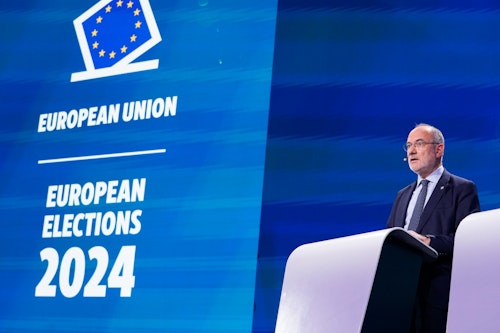
These results are not 'business as usual,' warns The Left's Walter Baier
Walter Baier, from The Left, was the last candidate to take the stage in the European Parliament. "Don't mistake these results for continuing business as usual," Baier said in a warning to mainstream parties.
In his intervention, Baier denounced the "failed politics of austerity" for creating the "breeding ground for the rise of the far right" and vowed to oppose "anti-social liberal politics" in the upcoming legislature. But, he added, The Left will be willing to cooperate with other "progressive forces" to advance topics such as social equality and social sustainability.
Asked about the eruption of the Bündnis Sahra Wagenknecht (BSW), the hard-left, Eurosceptic party launched by Sahra Wagenknecht in Germany, Baier said the party has not yet decided on its "political identity" and it was too early to say if it would join The Left on the European stage.
According to initial estimates, BSW is projected to overtake Die Linke, a long-time member of The Left.
Copyright 2024 The Associated Press.
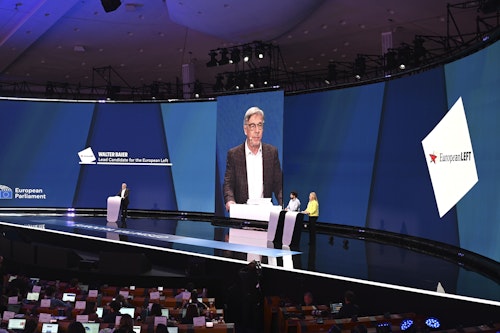
Far-right surges in Spain
Vox has doubled its presence in the European Parliament and a new Spanish far-right party will soon head to Brussels and Strasbourg.
The party, called 'Se acabo la fiesta' (The Party is Over), was the big surprise in Spain's early results after winning 4.58% of the vote - which could give it two or three sitting MEPs in Strasbourg.
Its founder, Luis "Alvise" Pérez Fernández, is a highly controversial anti-establishment social media personality who has become famous on channels such as Telegram, YouTube and Instagram, where he denounces the alleged corruption of politicians and the institutional and moral degradation he believes Spain and Europe are suffering from.
Since 2019, he's been a political analyst and independent consultant, but before his turn to the right, Alvise worked for the Ciudadanos (Citizens / Renew Europe) party, which didn't get any seats in the next mandate.
In recent years, his career has been marked by legal controversies, such as in 2020, when he made some accusations against the former mayor of Madrid, which led to a defamation lawsuit. Three years later, he had to delete the tweet and pay the mayor €5,000.
Far-right's wave spares Finland
The governing coalition, led by the EPP National Coalition Party of Prime Minister Petteri Otto, secured 4 out of 15 seats (24.8%). The Left and Centrist Renew parties came second and third with 17.3% and 18% respectively. S&D and Greens followed closely with 14.9% and 11% each. The far-right Finns Party, affiliated with ECR, which was expected to come third, ended up in last place with 7.60%.
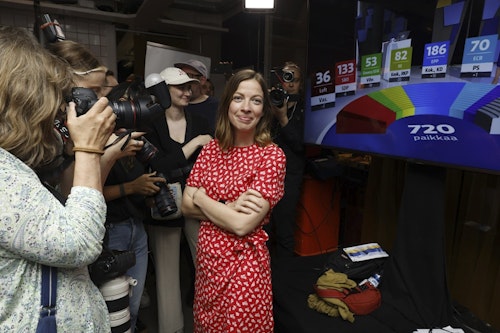
Party leader and election candidate Li Andersson smiles, surrounded by media, at the end of the Left Alliance's European parliament election reception in Helsinki, Finland, on June 9, 2024.
Fidesz scores worst result in a national or EU election in almost two decades
With 75% of the votes counted, Hungary's ruling right-wing Fidesz party was on track to secure a 44% share, its worst result in any elections in the past two decades.
The tumble is down to Péter Magyar, a former ally of Prime Minister Viktor Orbán now turned rival, whose Tisza party is seen winning about 30% of the vote.
These results if confirmed should see Fidesz and Christian Democrats allies send 13 MEPs to Brussels and Tisza seven.
Hungary: Newcomer Peter Magyar shakes Orban’s hold on power
In early predictions Hungarian prime minister Viktor Orbán’s ruling Fidesz party holds onto power but does worse than expected, as newcomer Péter Magyar……
Greens 'not happy' with result but ready to negotiate with the centre, says Bas Eickhout
Bas Eickhout, the co-lead candidate of the European Greens, says the party is "clearly not happy" with the number of seats it is projected to get. As of now, they are expected to fall from 71 to 53 MEPs, a drop that will diminish the political relevance they have acquired in the past five years.
"We are disappointed," Eickhout said, as he took the stage, noting the bad performance in Germany and France, the bloc's largest member states. Eickhout tried to find some silver linings by pointing out the positive results in Denmark, Sweden, Finland and his native Netherlands, as well as "new entries" from Croatia, Slovenia, Latvia, Lithuania and potentially Italy.
The candidate promised the Greens would work constructively and "take the responsibility" to build a pro-European centrist majority for the next mandate. "We need a stable majority in this house in order to deliver for the citizens," he said. The challenges the EU faces are "too big to play political games," he added, an apparent reference to Ursula von der Leyen's courting of Giorgia Meloni.
However, at no point did Eickhout explicitly refuse to back von der Leyen in her second term, meaning the door is open for negotiations.
Copyright 2024 The Associated Press.
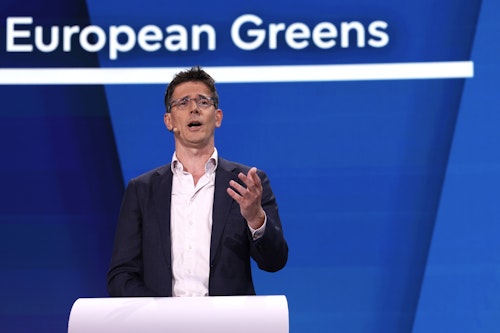
Valérie Hayer, from the liberals, is a no show
Valérie Hayer, one of three candidates of the Euroepan liberals, has not shown up on stage to speak.
Her absence was not explained but it can be assumed it is related to President Emmanuel Macron's abrupt decision to dissolve the National Assembly of France following his centrist party's poor showing against the far-right National Rally.
Hayer had booked train tickets from Brussels to Paris but did not make it in time, a spokesperson said.
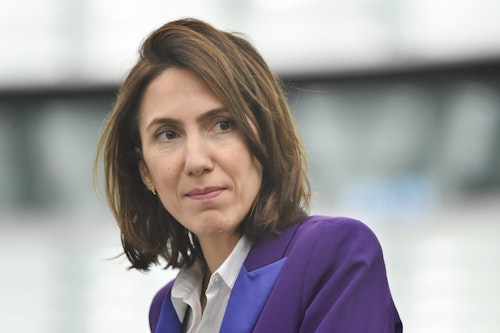
Nicolas Schmit says Socialists are ready to find the 'right compromises' with Ursula von der Leyen
Nicolas Schmit, the lead candidate of the Party of European Socialists (PES), says the party is "aware and confident that there's a readiness" on the side of Ursula von der Leyen to "work together, find the right compromises but also the right solutions."
Schmit, who, as European Commissioner for jobs and social rights, works under von der Leyen's leadership, underscored the importance of building a "solid" programme for the next five years that can respond to "people's expectations." He mentioned social policy, environmental regulation, internal and external security, economic competitiveness and disaster management as top priorities for his political family.
"We are ready to negotiate an agreement," he said.
The socialist figurehead stressed that there is "no place" and "no possibility" to cooperate with "those who want to dismantle this Europe we have built," a reference to von der Leyen's courting of Giorgia Meloni, which has enraged progressives.
Copyright 2024 The Associated Press. All rights reserved.
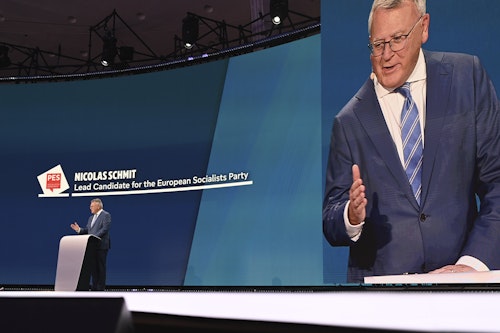
Results in Baltic countries are out!
- In Estonia, the 7 seats were divided as follows: PPE (21.6%) 2 seats, S&D (19.3%) 2 seats, 2 seats for Renew parties (ER, led by Kaja Kallas, at 17.9% and KE at 12.4%), and 1 to the right-wing ID party. This marks a loss for the two centrist parties, which had garnered 24% and 22% of support respectively in 2019.
- In Lithuania, the EPP governing party, Homeland Union, secured 21.33% of the vote (3 seats). Close behind is the S&D (18.01% - 2 seats), followed by 2 Renew parties (8.07% and 5.41% - one seat each), 2 Greens parties (9.13% and 5.96% - one seat each), and one ECR (5.77%).
- In Latvia, right-wing parties dominated the elections. The EPP narrowly clinched victory with 25.07% of the vote (2 seats), while the ECR received 22.08% (2 seats). Two right-wing parties, the green conservative United List, garnered 8.18%, and the nationalist populist party Latvia First gathered 6.16% of the votes. Renew, Greens, and S&D each received 9.36%, 7.42%, and 7.14% of the votes respectively.
People arrive to vote for the European Parliament election in Tallinn, Estonia, Sunday, June 9, 2024.
Von der Leyen offers to work with socialists and liberals for a strong centre
The lead candidates of the main parties have taken to the stage in the European Parliament to reflect on the results and outline their next steps.
The first one was Ursula von der Leyen, from the European People's Party (EPP), which came victorious in the elections. "We're by far the strongest party," she said as soon as she appeared.
Von der Leyen, who is seeking a second term at the top of the European Commission, said that "as of tomorrow" she would be reaching out to the socialists and the liberals to build a "majority in the centre for a strong Europe." Her words seemed carefully designed to appease critics who say she is veering too much to the hard right.
"In other words, the centre is holding," she said. "But it is also true that the extremes on the left and the right have gained support and this is why the result comes with great responsibility for parties in the centre."
"I have demonstrated in my first mandate what a strong Europe can achieve," she went on. "My aim is to continue with this path with those who are pro-European, pro-Ukraine and pro-rule of law."
Asked if she was willing to include other parties in her upcoming round of talks, such as the Greens, von der Leyen said that "first things first" and then "let's discuss other steps."
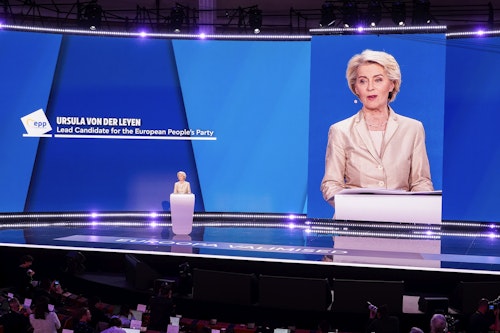
Who are the winners and losers?
With polls now closed across the EU, latest projections show some clear winners and losers, writes Euronews’ Jack Schickler.
With a strong performance in Italy, Giorgia Meloni has cemented her position as kingmaker – but France’s Emmanuel Macron and his centrist Renew grouping have been left reeling.
But losses in Renew and the Greens have been partly offset by a strong performance by Ursula von der Leyen’s European People’s Party.
The latest figures from the European Parliament suggest the four key pro-European parties – including Renew, the Greens, EPP and Socialists – still command over 63% of votes in the legislature.
EU election results hang in the balance as polls close
Hundreds of millions of Europeans are voting to select 720 Members of the European Parliament, with rising support for the far-right. #EuropeNews…
Environmental NGOs call on keeping climate policy at the top of the EU agenda
As the European Parliament undergoes a transformation, environmental NGOs are voicing their concerns about future climate policies.
"EU leaders must continue to prioritise the green and socially fair transition to ensure Europe's safety, sustainability, and competitiveness," wrote the wilderness preservation NGO, WWF.
According to a European Commission survey, the level of voter support for EU environmental action has remained high since 2019, increasing slightly from 83% to 84%. European voters consistently rank climate and environment as the second-most important issue the EU should address in the medium term, following security and defence.
With extreme weather events becoming more frequent, Greenpeace is highlighting the unpreparedness for the impacts of climate change on various fronts, including Europe's high energy prices, food security, infrastructure, water resources, financial stability, and public health.
Greenpeace EU campaigner Ariadna Rodrigo stated: "Whoever is in power, we will hold them accountable and remind them of their responsibility."
For WWF, this accountability begins with enforcing current legislation. "The European Green Deal is the only way to ensure Europe's safety and competitive sustainability," emphasised Tycho Vandermaesen, Policy & Strategy Director of WWF European Policy Office.
More on the danger of climate change here ⤵️
Europe is warming twice as fast as other continents, report warns
Warming weather will impact health, nature and the economy, the report by WMO and Copernicus says.…
'Without us, there is no majority possible,' says the socialist top candidate
The two main political groups in the next European Parliament, the EPP and the S&D, are celebrating the results of their members across Europe - but in very different ways.
While the EPP's top candidate, Ursula von der Leyen, was given a star-studded welcome at the swanky Stanhope Hotel, located in Brussels’ Square de Meeûs, the S&D's Nicolas Schmit arrived at a crowded bar outside the European Parliament in Brussels, with no people holding banners (but beers!) and no podium from which to speak.
The whole EPP event chanted the Commission President's name as she proclaimed her victory: "No majority can be formed without the EPP," the German candidate told the crowd.

Among them was Philipp Wagner, from the German Young Union in Schwerte (Dortmund), who told Euronews that von der Leyen was "a person you can count on" and the right person to find the necessary compromises.
"It's quite a difficult job to always find an agreement with everyone and everything, I think she's the right person for that".
Schmit, on the other hand, addressed his party members from the entrance of the Ginnette bar in the Place du Luxembourg.
“Admit it, this event is much more fun,” a party staff told Euronews at the event.
The Luxembourgish EU Commissioner for jobs recalled his group's electoral commitment not to join forces with the far-right parties and celebrated their silver medal.
"We will be a strong second and without us, there is no majority," the Luxembourger told the Socialist family on the terrace of the bar, stressing that was already an important achievement.
Greens going through 'rollercoaster' as more results pour in
The European Greens are going through a "rollercoaster" as more results pour in, says lead candidate Bas Eickhout. The political family got a beating in Germany and Austria, where they are part of unpopular coalitions. In France, they plunged from 12 to 5 seats, a "clearly disappointing" showing, Eichkout said.
But elsewhere, things are looking up: the Greens appeared to have secured seats in the Netherlands (4), Sweden (3) and Denmark (3), and they are expected to win a handful of seats from Italy and Croatia, where they had no representation before. Additional representation could come from Belgium, Luxembourg, Latvia and Lithuania, among others.
"What a night," Eickhout said.
New results. Italian Greens are in! And also a great result for @VSinkevicius in Lithuania! Plus solid results in Belgium and Luxembourg. What a rollercoaster!
— Bas Eickhout (@BasEickhout) June 9, 2024
Nationalist N-VA wins in Belgian national election
The right-wing New Flemish Alliance (N-VA) emerged as the biggest winner of elections in Belgium on Sunday, with the extreme-right pro-separatist Vlaams Belang in second place. Belgium voted not only for the EU Parliament, but also in regional and national elections.
At the national level, the nationalist N-VA led by Bart De Wever received 18.6% of votes, up by two points compared to 2020, while Vlaams Belang, at 15.4%, saw a 3.5 point jump, according to the preliminary results published by broadcaster VRT.
The liberal OpenVLD of Prime Minister Alexander De Croo lost dramatically: it’s now expected to get 5.8%.
De Croo, speaking on election night, said it is a “difficult night” for his party.
“We have lost this election. I was the face of the campaign. This is not the result that we hoped for. I take full responsibility,” he said. His party will decide about next steps in the coming days.
Giorgia Meloni secures victory in Italy, cementing her role as power broker
Giorgia Meloni and her Brothers of Italy (FdI) have won the elections in Italy, with 26% (minimum) to 30% of votes (maximum), according to an exit poll released by RAI. The result cements Meloni's position as the power broker of the hard right and one of Europe's most influential figures.
The centre-left opposition of the Partitito Democratico (PD) has earned 21% to 25% of votes, followed at a distant third by the Five Star Movement, with a range of 10% to 14% of votes. Meloni's junior partners, Forza Italia and Lega, are polling much lower, dipping into single-digit territory.
Gli exit poll in Italia, ore 23.00#europee pic.twitter.com/jWY7Wup8Cj
— RaiNews (@RaiNews) June 9, 2024
Result in Romania: Overwhelming victory for the presidential party
The governing National Coalition for Romania, composed of the Social Democratic Party (PSD) and the National Liberal Party (PNL), managed to gather 54% of the votes. However, the newly elected lawmakers will be split between the EPP (9 seats) and the S&D (13). It is a major victory for the ruling party as the second most endorsed party, the extremist nationalist Alianța pentru Unirea Românilor (AUR), is estimated at 14%, 30 points below.
This challenger is a new arrival at the European Parliament where it will have 5 seats.
A woman exits a voting cabin after casting her vote in European and local elections in Baleni, Romania, Sunday, June 9, 2024.
Conservatives and socialists tied in Portugal, as far-right Chega enters Parliament for the first time
We have another tie: Portugal. The Socialist Party (PS) and the conservative Aliança Democrática (AD) are neck and neck, according to the first available estimates. The PS secures 31.40% and seven MEPs, while the AD earns 30.60% and seven MEPs, virtually identical numbers. However, compared to 2019, the PS loses two seats, while the conservatives maintain their numbers.
The poll also shows the liberals of Iniciativa Liberal (IL) with two MEPs, up from zero in 2019, and The Left dropping from two to four. Meanwhile, the far-right Chega, around which the other parties have installed a cordon sanitaire, will enter the European Parliament for the first time with two lawmakers.
Polish results: Centre-right Tusk coalition secured more seats than the conservative PiS
In Poland, Prime Minister Donald Tusk's Civic Coalition (KO) and fellow EPP ally, the Third Way coalition, jointly secured 20 seats. They respectively garnered 38,2% and 8,2% of the votes to claim first place.
The main opposition party, the conservative Law and Justice (PIS), from the ECR group at the European Parliament, came a close second to the governing party with 33,9% of the votes. A consolation after the loss of power by PiS in November 2023.
The turnout stood at 39,7 %, down six points compared to 2019.
More on the story here ⤵️
Poland exit polls: PM Tusk keeps upper hand over PiS in EU elections
Tusk’s political alliance, Civic Coalition, maintained its lead over the right-wing populist Law and Justice or PiS, with the far-right Confederation……
'The pro-European centre has held,' Roberta Metsola tells Euronews
Reacting to the results that are coming in, Roberta Metsola, the president of the European Parliament, told Euronews that it’s too early to say whether her political family, the European People's Party (EPP), which has come first, will work with the hard right of Giorgia Meloni.
“We are still waiting to get the results from countries like Italy, however from the first projections it looks like the constructive, pro-European centre has held,” Metsola said.
“The political groups will start to meet us from tomorrow, to see how this European Parliament will look like. It works with majorities and it looks like that will be the centre.”
Roberta Metsola, European Parliament President tells Euronews "from the first projections, it looks like the constructive pro-European centre has held." pic.twitter.com/sd6U6nbEVi
— euronews (@euronews) June 9, 2024
Socialists win in Sweden, defeating PM Kristersson
The Social Democrats have won the elections in Sweden, securing 23.10% of votes and five MEPs, the same number they have now, according to an exit poll released by the public broadcaster SVT.
By contrast, the centre-right Moderaterna of Prime Minister Ulf Kristersson has come at a somewhat distant second, with 17.30% of votes and 4 MEPs. Meanwhile, the Greens retain their three MEPs.
The Sweden Democrats, which have a confidence-and-supply agreement with the prime minister, improved their showing, going from two to three MEPs. At the European level, the party is aligned with the hard-right European Conservatives and Reformists (ECR) group, which progressives have used as an attack against Kristersson.
According to the exit poll, the liberals maintain their three MEPs and The Left goes from one to two. Overall, the projection suggests a quite stable picture compared to 2019, with limited shifts.
EU-val 2024 – följ senaste nytt
Fem år sedan sist – nu är det dags för EU-val igen. Den 6-9 juni ska ledamöter till Europaparlamentet väljas. Följ SVT Nyheters liverapport om EU-val……
'No majority can be formed without EPP,' declares a victorious Ursula von der Leyen
Ursula von der Leyen, the lead candidate for the centre-right European People's Party (EPP), has just addressed supporters at the party's headquarters in Brussels after a first estimate showed it remains the strongest formation in the European Parliament, with 181 MEPs.
"No majority can be formed without the EPP," she declared amid chants of "Ursula, Ursula!"
"We are the strongest party. We are the anchors of stability and voters acknowledge our leadership in the last five years," she went on. "We were determined, we were united, we made it!"
Von der Leyen, who is vying for a second term at the top of the European Commission, reflected on her campaign, during which she visited 17 member states and 31 cities. "This was one of the best experiences I've ever (had) in my political life. This was really great," she said, noting she had sensed a "lot of confidence and trust" in the EPP and the European Union. "And tonight, this is confirmed," she told supporters.
Recently, von der Leyen has been criticised for making overtures to the hard right of Italian premier Giorgia Meloni in a bid to secure the necessary votes she needs to become again president of the European Commission. In her address, she attempted to strike a centrist position, saying that "together with others, we will build a bastion against the extreme from the left and from the right. We will stop them, this is for sure!"
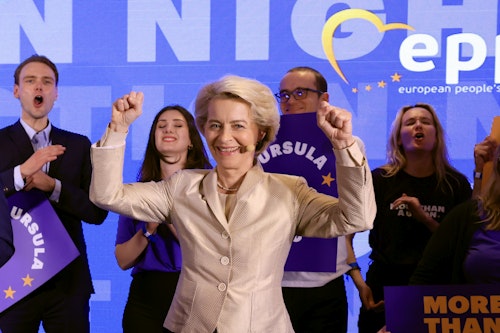
In shock move, Macron dissolves French National Assembly
French President Emmanuel Macron announced shortly after 21:00 CET that he would dissolve the national assembly, arguing: "I can't pretend that nothing has happened."
His centrist Renew party was handed a heavy blow by coming in a very distant second in the European elections to the far-right National Rally, scoring 15.2% and 31.5% respectively.
Jordan Bardella, the RN's lead candidate for these elections, had in his victory speech delivered shortly after the provisional results came out at 20:00 CET, called for such a move.
Macron, in his five-minute address released on social media, retorted that "the rise of the nationalists and demagogues is a threat not only to our nation but also to our Europe and to France's place in Europe and in the world".
"The extreme right is both the impoverishment of the French people and the downfall of our country. So at the end of this day, I can't pretend that nothing has happened," he added.
Centrist and left-wing forces dominate in Denmark
According to estimates, the Socialistisk Folkeparti, affiliated with the Greens/EFA in the European Parliament, came in first with 18.4%. Kira Marie Peter-Hansen, the youngest ever MEP elected in 2019, will therefore sit in the hemicycle for five more years alongside two of her fellow party members.
Yet, the Green party and the Socialdemokratiet (S&D) also both secured 3 seats each out of the country's 15 seats.
But the European parliamentary group that is set to become the largest beneficiary from Denmark is the liberal Renew, as three parties (Moderaterne, Radikale Venstre, and Venstre – Danmarks Liberale Parti) retained 4 of the 6 seats they have occupied since 2019.
Denmark did not experience an extreme right shift, as they only secured one seat, the same as in 2019.
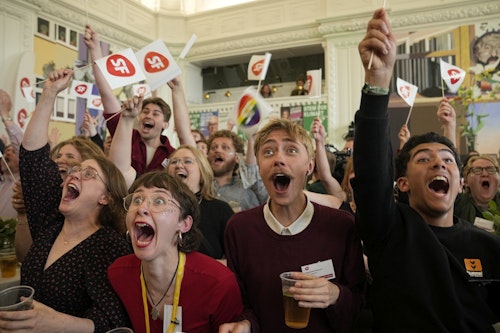
People react to exit poll during the European Parliament Election, at the headquarters of the Socialist People's Party at Christiansborg, in Copenhagen, Sunday, June 9, 2024.
Analysis: Once again, Pedro Sánchez defies the opposition and the odds
Spanish Prime Pedro Sánchez has built a reputation as a political survivor, staving off repeated attempts to bring down his progressive executive since he entered office in 2018.
Last year, amid an extremely hostile campaign, Sánchez managed to be re-elected after the conservative Partido Popular, the technical winner of the general elections, failed to secure the necessary support to mount a successful investiture. This time, in an even more polarised atmosphere, the premier appears to have closed the gap between his Socialist Party (PSOE) and the Partido Popular, with just two percentage points of difference, according to exit polls.
This represents an achievement for Sánchez, who has been the target of relentless attacks over his controversial plans to grant amnesty to Catalan separatists. In April, Sánchez temporarily suspended his agenda after his wife Begoña Gómez was accused of corruption, a legal case that the PM described as politically motivated. Gómez has been summoned to appear before the judge on 5 July.
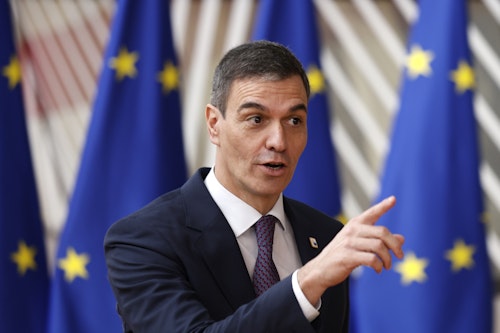
First full estimate for the European Parliament
The European Parliament has released a full picture of the next hemicycle, based on exit polls and estimates available so far. The results show the Grand Coalition of Pro-European parties (EPP, S&D and Renew Europe) is set to retain its ruling majority, with 398 MEPs out of 720. But the hard-right ECR and the far-right ID are poised to make inroads, which suggests the Parliament as a whole will turn to the right in the next five-year mandate. Additionally, the considerable number of non-attached MEPs could turn the tables around once negotiations kick start.
Here's the breakdown:
- 181 MEPs for the European People's Party (EPP)
- 135 MEPs for the Socialists & Democrats (S&D)
- 82 MEPs for Renew Europe
- 71 MEPs for the European Conservatives and Reformists (ECR) group
- 62 MEPs for Identity and Democracy (ID)
- 53 MEPs for Greens/EFA
- 51 MEPs for Non-Attached
- 51 MEPs of newly elected members who are not yet allied to any group
- 34 MEPs for The Left
Third generation Le Pen enters European Parliament
Marion Maréchal, grand-daughter of National Rally founder Jean-Marie Le Pen and niece of Marine Le Pen, is likely to soon tread the hallowed ground of the European Parliament.
Maréchal, 34, was the lead candidate for the far-right Reconquest! party, which, according to an exit poll, secured 5.2% of the vote, just past the 5% threshold needed to get a seat.
Her grandfather, who was convicted and fined multiple times for hate speech and contesting crimes against humanity, was an MEP for 34 years, while her aunt represented her party in Brussels and Strasbourg for 13 years.
Maréchal likely knows Brussels well as her husband, Vincenzo Sofo, with whom she shares her second child, has been an MEP since 2020 for the hard-right Brothers of Italy of Prime Minister Giorgia Meloni. Sofo is running to retain his seat and will know his fate after 11:00 CET when polls close in Italy.
Far-right Bardella calls for anticipated legislative elections in France
In a victory speech delivered before his supporters gathered in Paris, Jordan Bardella, the head of the far-right National Rally, said results are a "clear message addressed to Emmanuel Macron and European leaders and marks our country's determination to see the European Union change direction".
He called for a "reassertion of control over migration policy" and the "defence of jobs" - but above all, he demanded that Macron dissolves the national parliament and calls new elections.
Marine Le Pen, the president of the RN group in the national assembly, reacted by saying the results prove that voters "no longer want a technocratic, out-of-touch and increasingly brutal European construction that denies their history, flouts their fundamental prerogatives and results in a loss of influence, identity and freedom."
En plaçant la liste du Rassemblement National à un niveau historique, le peuple français a envoyé un message très clair à un pouvoir macroniste, qui scrutin après scrutin, se désagrège : il ne veut plus d’une construction européenne technocratique, hors-sol et de plus en plus…
— Marine Le Pen (@MLP_officiel) June 9, 2024
Conservatives win very narrowly in Spain, as Pedro Sánchez holds his ground
The conservatives of Partido Popular (PP) have narrowly won the elections in Spain, according to an exit poll by RTVE and Forta.
With 32.4% of votes, the PP would get between 21 and 23 MEPs, up from 13 now. But the socialists of Prime Minister Pedro Sánchez are holding their ground, with 30.2% of votes and 20 to 22 MEPs, in line with the 21 they have today. The far-right party of Vox would improve its representation, from 4 now to between 6 and 7 MEPs. The leftist alliance of Sumar, the junior partner of Sánchez's coalition, would secure 3 to 4 seats, while Podemos, another left-wing party, would settle between 2 and 3 legislators.
However, the greatest surprise in the country is the sudden eruption of Se Acabó La Fiesta ("The Party Is Over"), a party founded this year by social media personality Alvise Pérez that describes itself as anti-establishment but that analysts link with far-right populism. According to the same poll, Se Acabó La Fiesta would enter the European Parliament with 2 to 3 MEPs.
🔴 ÚLTIMA HORA | El PP ganaría las #EleccionesEuropa con el 32% de los votos, por delante del PSOE (30%), según el sondeo de Sigma Dos para @rtve
— RTVE Noticias (@rtvenoticias) June 9, 2024
Vox sería tercera fuerza por delante de Sumar, Podemos, Ahora Repúblicas, SALF, Junts y CEUS #EuropaDecideRTVE… pic.twitter.com/kL1qCx1BRn
Far right and greens in Croatia secure their first MEPs
More news from Croatia, according to exit polls: the far right of Homeland Movement and the Greens of Možemo! would get one MEP each, marking the first time both formations enter the European Parliament.
Homeland Movement is not affiliated with any group yet but has expressed interest in joining the far-right Identity and Democracy (ID) family.
National Rally trounces Macron's Renew party with third of the vote
The far-right National Rally (RN) party, led by 28-year-old Jordan Bardella, has secured a whooping 31.5% of the votes in France, according to an exit poll, the first time that a French party has won more than 30% in European elections since 1984.
Crucially, this is double the amount of votes won by President Emmanuel Macron's centrist Renew party (15.2%), which avoided a double embarrassment by narrowly beating the Socialist Party for second position.
The Socialists, sheperded in these elections by Raphael Glucksmann, had gained momentum over the past month with its unabashed pro-EU stance while Renew's lead candidate Valérie Hayer, a 38-year-old MEP, had largely failed to inspire the electorate and the party's leadership: Renew sent Prime Minister Gabriel Attal to debate Bardella for one of the two heads-to-head between the two camps.
Glucksmann's Socialists are believed to have captured 14% of the vote.
Von der Leyen and Weber celebrate conservative victory in Germany
Ursula von der Leyen and Manfred Weber, the two main faces of the European People's Party (EPP), have taken to social media to celebrate the conservative victory in Germany.
According to exit polls, the CDU-CSU alliance has comfortably won the elections in the country, earning 30 MEPs and almost 30% of all votes.
"I am happy about the excellent result of CDU and CSU!" said von der Leyen, who is vying for a second term at the top of the European Commission. "We had the right topics. The voters have confirmed this."
Weber described the CDU-CSU as the "bulwark" against the far-right of Alternative for Germany (AfD), which is projected to take 17 MEPs to Brussels. Weber then took a swipe at the ruling coalition of Chancellor Olaf Scholz, saying it "can no longer reach the people." The three parties of Scholz's executive have been punished by voters, particularly the Greens, who appear to have fallen from 21 to 12 MEPs.
Ich freue mich über das ausgezeichnete Ergebnis von @CDU/@CSU!
— Ursula von der Leyen (@vonderleyen_epp) June 9, 2024
Vielen Dank an @_FriedrichMerz, @ManfredWeber & die @EPP
— und alle, die so unermüdlich um jede einzelne Stimme gekämpft haben!
Wir hatten die richtigen Themen.
Die Wählerinnen und Wähler haben das bestätigt. pic.twitter.com/GEbYX8hWaZ
Victory for the center right GERB/SDS coalition in Bulgaria
With 26.2% of the votes, the conservative populist ruling coalition is believed to have won the most seats, securing 6 out of 17. Close behind, in second place, is the centrist coalition (We Continue the Change, Volt Bulgaria, and Democratic Bulgaria) with 15.7%. The extreme right Revival party comes in third.
This is a significant victory for Revival, as they only garnered 1% of the vote in 2019 and did not secure any seats.
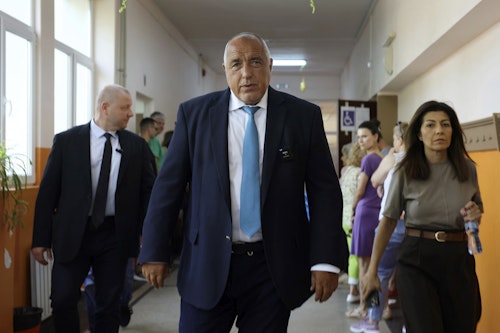
Bulgarian former Prime Minister Boyko Borissov, leader of GERB voting on June 9.
Conservatives and socialists tied in Malta
Malta, a notoriously bipartisan country, is split, according to the first estimates released by the European Parliament. The Labour Party of Prime Minister Robert Abela would get three MEPs with 44.67%, down from the four they have today. At the same time, the Nationalist Party, which falls under the conservative family, would get another three MEPs, up from the two it has now, with 42.52% of votes.
Roberta Metsola, the sitting president of the European Parliament, hails from the Nationalist Party and is therefore guaranteed to be re-elected as a legislator.
Conservatives win in Croatia - exit poll
The first estimations from Croatia are in: the centre-right of Prime Minister Andrej Plenković has secured 33.74% of votes, which would translate to six MEPs, according to an exit poll released by the country's news agency HINA. This would give the Croatian Democratic Union (HDZ) an additional two lawmakers, up from four today. The centre-left alliance of SDP, which mixes liberals and socialists, would come second with 27.81% and four MEPS.
The far-right Homeland Movement, with whom Plenković recently signed a coalition agreement, would secure 8.67% of votes, but it's not yet clear if this would be enough for them to enter the European Parliament for the first time. Meanwhile, the Greens of Možemo! would get 5.84% of all votes, up from the 1.8% they got in 2019.
Prema izlaznim anketama najviše glasova na izborima za Europski parlament dobio je HDZ (33,74 %) što bi mu donijelo 6 mandata, a slijede SDP i partneri s 27,81 % ili 4 mandata. Po jedan mandat osvajaju Domovinski pokret (8,67 %) te Možemo! (5,84 %). pic.twitter.com/hsv7MOZ5Lg
— HINA (@Agencija_HINA) June 9, 2024
Von der Leyen is now in Brussels
Ursula von der Leyen, who is widely expected to secure a second term at the helm of the EU's powerful executive arm, the European Commission, has arrived at the European People's Party headquarters in Brussels.
She voted earlier in the day in Hannover, Germany.
Like the other spitzenkandidaten in the race, she is expected to deliver a speech in Parliament later tonight.
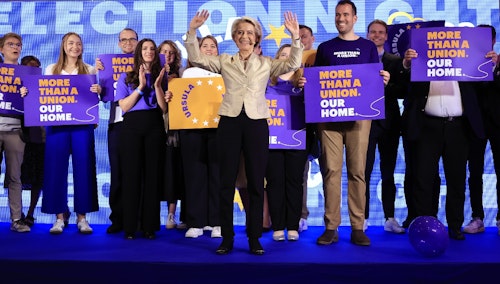
So far, a 'mixed bag' for the Greens
The first results of the EU elections are pouring in and the Greens, the party that rose to the political frontline in 2019, are trying to make sense of them. In the Netherlands, the alliance between Socialists and Greens has come on top, with eight MEPs, against the seven secured by the far-right of Geert Wilders, according to estimated numbers. But in Germany, the party, which is part of the ruling coalition of Olaf Scholz, has been resoundingly punished, falling from 21 to 12 MEPs, according to an exit poll released by ARD. It's the largest downgrade in the country.
"Let's be honest. This is very disappointing," said Bas Eickhout, one of the party's lead candidates, reflecting on the initial numbers from Germany.
"So far mixed bag of results for Greens. Solid 2 seats for Austria, one seat gain in Latvia and of course still good result from Netherlands," he noted, in a separate social media post.
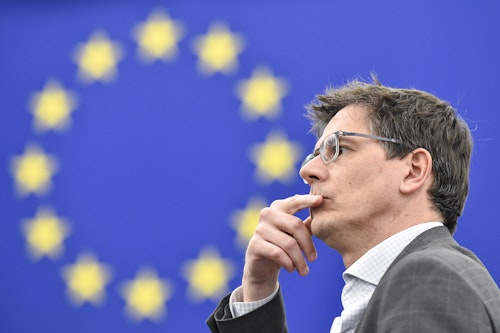
In the Netherlands, wins for the Greens/Socialists coalition confirmed
The Dutch voted on Thursday but the European Parliament's official estimates are only available now. Those confirm the exit polls Euronews previously analysed.
Check out below our full piece on the victory of the pro-EU alliance - but also the major win for the hard right PVV party ⤵️
Timmermans and Wilders both celebrate on Dutch election night
Timmermans’ GreenLeft-Labour alliance is set to win eight seats in the new European Parliament, while PVV and its leader Geert Wilders won seven. #EuropeNews…
Turnout in Spain down 11 points compared to 2019
Interest in the EU elections among Spaniards seems to have dampened: turnout at 18.00 CET had reached 38.38% according to the national broadcaster RTVE. This is considerably down from the 49.44% rate seen in 2019 when the country also held a series of local and regional elections. Since then, the country has become increasingly polarised.
Polling stations in Spain are due to close at 20.00 CET.
🔴DIRECTO #EleccionesEuropeas | La participación en España a las 18:00 horas se sitúa en 38,35%
— Radio 5 (@radio5_rne) June 9, 2024
▪️ Supone 11,09 puntos menos que en las elecciones de 2019, cuando coincidieron con las autonómicas y municipales
🗳️Toda la información en https://t.co/DQlYDDwTxo y en @rne pic.twitter.com/QZsjUH4mz4
Conservatives lead comfortably in Germany - exit poll
The centre-right Christian Democratic Union (CDU) is comfortably leading the elections in Germany, according to an exit poll conducted by infratest dimap for ARD.
The CDU and its Bavarian partner CSU would take 29.5% of the votes and 29 of the 96 available seats. This would be good news for Ursula von der Leyen, who hails from the CDU and is vying for a second term at the top of the European Commission. The far-right Alternative for Germany (AfD) would come second with 16.5% and 17 MEPs, up from 11 now. Meanwhile, the three parties of the coalition led by Chancellor Olaf Scholz lag behind: 14 MEPs for the Socialists (SPD), 12 MEPs for the Greens and five MEPs for the Liberals (FDP). If confirmed, this would be a big defeat for the Greens, who in 2019 got their best result ever with 21 MEPs.
The far-left of Die Linke would secure three representatives and the new leftist party led Sahra Wagenknecht (BSW) would enter the Parliament with five MEPs overnight. Under the category of "others," the poll classifies an additional 11, including three for the federalist Volt.
Nach der Prognose von infratest dimap für die Europawahl 2024 ist die CDU/CSU stärkste Kraft und kommt auf 29,5 Prozent. Die AfD erzielt 16,5 Prozent und landet auf Platz zwei. Die SPD erreicht 14 Prozent, die Grünen landen bei 12 Prozent. Das BSW liegt bei 5,5 Prozent, die FDP… pic.twitter.com/nzWTAIHYu1
— tagesschau (@tagesschau) June 9, 2024
Greek ruling party New Democracy wins election - exit poll
The ruling liberal-conservative party of Prime Minister Kyriakos Mitsotakis, New Democracy (EPP), is believed to have come out on top and could retain its current tally of 8 MEPs, according to an exit poll.
The radical left-wing Syriza (The Left) party looks set to be the biggest loser of the night in Greece and lose two MEPs and retain only four seats.
Centre-left PASOK (S&D) however has increased its influence and gained one seat, according to the exit poll.
Greece, with its population of 10.43 million, has a delegation of 21 seats.
In Cyprus, the EPP and The Left are neck and neck - exit poll
Cyprus media, according to Alpha exit polls, estimate that the liberal-conservative Democratic Rally (EPP), the party in the governing coalition, has secured between 25.5% and 28.5% of the vote. Meanwhile, the Progressive Party of Working People (The Left) is estimated to have received between 23% and 26%. The margin of error makes it impossible to determine a clear-cut winner yet, with the final results to be confirmed later.
Cyprus sends 6 MEPs to the European Parliament.
Exit Poll Alpha: Πρώτος ο ΔΗΣΥ, τρίτος ο Φειδίας απώλειες για τους άλλους
Τα τρία πιθανά σενάρια για το αποτέλεσμα των Ευρωεκλογών…
French turnout slightly up from 2019 so far
By 17:00 CET, turnout across France had reached 45,26% or two percentage points higher than at the same time in 2019.
The overall French turnout in 2019 was 50.12%.
#Européennes2024 I Taux de participation à 17h pour les élections #Européennes2024 en France : 45,26%.
— Ministère de l'Intérieur et des Outre-mer (@Interieur_Gouv) June 9, 2024
🗳En 2019, à la même heure, le taux de participation était de 43,29%.
Rendez-vous sur : https://t.co/BCeBfSRf37 pic.twitter.com/bJXej4IQ9E
Hungarian turnout at record high, breaks 50% threshold
More than half of Hungary's 7.8 million voters had cast a vote in these elections by 17:00 CET — a record high for the country since it joined the EU in 2004.
The previous record had been set in 2019 with a 43.36% turnout.
European Parliament revamped for election night
The hemicycle of the European Parliament in Brussels has been turned into a stage where projections and results will be gradually shown after 18.15 CET. The Parliament's spokespeople are acting as anchors of the events while the seats, traditionally reserved for lawmakers, have been occupied by journalists.
Last briefing before the #EUElections2024 night. Livestream starting now from the European Parliament Hemicycle in Brussels: https://t.co/hof6yF2FTy pic.twitter.com/2f9xHjMPsY
— Delphine Colard (@DelphineColard) June 9, 2024
Far right leads in Austria and doubles its MEPs, according to exit poll
The far-right Freedom Party of Austria (FPÖ) leads the elections in Austria, with six MEPs (up from three) and 27% of votes, according to a poll by the public broadcaster ORF. This would mark the first time the party wins a nationwide election, ORF notes.
Second place is a tight battle between the centre-right ÖVP, with five MEPs (down from seven) and 23.5%, and the socialists of SPÖ, with also five MEPs and 23% of votes. The Greens, which are the junior party of the ruling coalition led by ÖVP, would take 10.5% and lose one of their three MEPs, while the liberals of NEOS would secure two lawmakers, up from one today.
ORF notes the communist party KPÖ, with just 3% of votes, still has a chance of making it into the Parliament, as the fluctuation rate of the poll is 2.5 percentage points.
Trendprognose: FPÖ führt, Duell um Platz zwei
<div id=vue-app-ProjectionWidget></div>Die letzten Wahllokale in Österreich haben geschlossen – und für die FPÖ zeichnet sich ein Wahlsieg ab. In einer……
In Belgium, the first results are coming in, and complications are piling up
Belgians are voting today in three elections: European, federal, and regional. The smallest municipalities, which closed their polling stations at 14:00 CET, are announcing their results. This is the case for the small Flemish town of Herstappe, with 79 residents, where the Open VLD party leads with 26.4% of the vote.
Across the country, numerous incidents have been reported at polling stations. The mayor of a Flemish town has filed a complaint against election officials for speaking French to Flemish voters. According to the RTBF, in the Brussels-region municipality of Woluwe-Saint-Lambert, voters faced wait times of up to two hours due to high turnout and a computer system failure. In this case, and for other municipalities experiencing this delay, the polling stations will remain open until 18:00 CET.
Unconfirmed reports in Belgian media indicate that minors aged 16 and 17, who are only legally allowed to vote in the European elections, have been voting in other elections as well. This human error could lead to re-elections in some polling stations.
Finally, Maxime Prévot, the president of Les Engagés (EPP), was harassed after voting in Namur. An intoxicated individual attempted to push him into the Meuse River after insults were shouted.
The official results for Belgium are expected around 22:30 PM CET.
What's at stake as Europe goes to the polls?
As exit polls start trickling in, here's what you need to know about these European elections in a nutshell.
There are 720 seats up for grabs, with right-wing parties expected to clinch more of them than ever before, potentially tipping the political balance in the EU towards the right.
But pro-European forces have in recent weeks centred their campaigns around containing the far-right surge. First estimations for the Netherlands suggest that a progressive alliance of Green and socialist parties narrowly outperformed the far right, against some of the polls' predictions. If this sets the tone for other national battlegrounds, the rightward tilt could be less pronounced than expected.
Right-wing parties club together to form two groups in the European Parliament. But many right-wing forces will be new entrants to the European Parliament, meaning some of their seats will initially be categorised as non-affiliated until they confirm their group affiliation.
This means we'll have to wait weeks until we get an accurate picture of the new configuration of the European Parliament.
European elections: How the vote could disrupt the Brussels status quo
Opinion polls predict voters will veer to the right - and shift the balance of power in Brussels. #EuropeNews…
Election night tip: Watch out for the non-attached MEPs
As we wait to hear the first provisional results of the elections, there's one thing you should watch out for: the number of non-attached MEPs, which is set to be quite large. Non-attached, or non-inscrits, refers to lawmakers who are not affiliated with any political group in the European Parliament, something that reduces their influence and speaking time. This, however, doesn't mean they lack ideology: many of them share positions similar to the main groups, even if they are not bound by their internal decision-making.
The current assortment of non-attached MEPs includes Hungary's Fidesz, Italy's Five Star Movement, Slovakia's SMER, Spain's Junts and, most recently, Alternative for Germany (AfD), which last month was expelled from the far-right Identity and Democracy (ID) group over controversial remarks its lead candidate. According to Euronews' Polls Centre, the number of non-attached MEPs could jump from 61 to 79, the fourth-largest formation in the hemicycle.
After the elections, negotiations will begin to bring some of these MEPs into the official groups. Fidesz has publicly voiced its intention to join the hard-right European Conservatives and Reformists (ECR) while the Five Star Movement has spent the last few years lobbying the Greens for membership. These talks will be crucial and might easily make one group bigger than another – and vice versa.
Non-affiliated parties to tip balance in next EU Parliament: new poll
Exclusive Ipsos polling for Euronews shows non-affiliated parties could have a defining stake in the arithmetic - and votes - of the future European Parliament.……
Longing for the results? Us, too!
That’s why our colleagues, Cynthia Kroet and Jack Schickler, have prepared an in-depth analysis of projections by country and party. They are currently discussing expectations, and will update the story with the first results starting at 18.00 CET and continuing throughout the night.
Stay tuned to learn more about the future composition of the European Parliament!
EU election results hang in the balance as polls close
Hundreds of millions of Europeans are voting to select 720 Members of the European Parliament, with rising support for the far-right. #EuropeNews…
Lithuanian turnout at 17.00 local time nearly half that of 2019
Less than a fourth of Lithuanian voters had exercised their right to vote by 17.00 local time (16.00 CET), according to the Central Electoral Commission.
This is just over half the tally observed at that time for the 2019 elections.
The country of 2.8 million inhabitants has 11 Members of the European Parliament. According to the Euronews Poll Centre, the Social Democratic Party of Lithuania (LSDP) should have a comfortable victory, with the conservative Christian Democrats (TS-LKD) coming in a distant second.
Lithuania, European Parliament election today:
— Europe Elects (@EuropeElects) June 9, 2024
Turnout at 4 PM CEST (5 PM EEST)
...
2019: 44.9%
2024: 23.5%
Source: Central Electoral Commission
Special election page: https://t.co/1An2baUJmP#EP2024 #rinkimai2024 pic.twitter.com/8spu95XjP3
Hungarian turnout now over 11 points higher than in 2019
More than 42% of Hungarian voters had already cast their ballot by 15.00 CET, according to the National Election Office.
That's 11.5 points higher than during the last elections in 2019.
Péter Magyar, a former ally of Prime Minister Viktor Orbán turned opponent, is challenging the ruling hardline, nationalist Fidesz party. His TISZA (Respect and Freedom party) is projected to secure nearly a fifth of the vote, according to the Euronews Poll Centre.
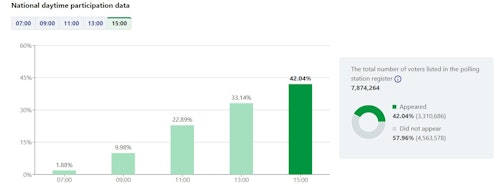
French turnout so far on par with 2019
According to the French Ministry of Interior, 19.8% of the electorate had cast their ballot by 12.00 CET, more or less on par with the 19.2% turnout observed at the same time in 2019.
Just over half of French voters took part in the European elections five years ago.
Élections européennes : taux de participation à 12h
Les élections européennes étaient organisées les 8 et 9 juin 2024 en France. Le 8 juin, les électeurs ont voté à Saint-Pierre-et-Miquelon, en Guadeloupe,……
Looking for an election party?
Election nights are inherently emotional, blending anticipation, celebration, and disappointment. So, what better way to release those emotions than with a party?
Our colleagues Paula Soler and Gerardo Fortuna have prepared a guide to political party gatherings in Brussels and abroad. It’s a unique opportunity to witness officials expressing joy (...or disappointment).
Click on the link below to check it out. However, nothing guarantees you will get an invite!
Where are the EU parties election partying, or commiserating?
From the quiet elegance of the Brussels’ Stanhope Hotel to the buzzing energy of Berlin’s Columbiahalle, here’s a look at where political families from……
When will we know the result?
This is a marathon election like no other, with results trickling in during the day as polls close at different times across the continent.
Here's when we're expected to get the first estimations:
18.15-18.30 CET - First national estimates expected from Austria, Cyprus, Germany, Greece, Malta and the Netherlands
19.15 CET - National estimates from Bulgaria and Croatia
20.15 - 20.45 CET - National estimates from Denmark, France and Spain, as well as the first projection of the European Parliament's hemicycle based on early estimates
21.15-21.30 CET - Four additional national estimates from Poland, Portugal, Romania and Sweden
23.15 CET - Final national estimate from Italy, with an updated projection of the hemicycle
00.15 CET - Provisional result for Belgium
This means we may not have a clear-cut picture of the new hemicycle until tomorrow.
Many parties are expected to be categorised as 'non-attached' when results roll in tonight, but many will likely join one of the European Parliament's seven political factions over the coming days and weeks.
This means the political balance of power could shift depending on the parties' chosen affiliations.
When will we find out the results of the European elections?
The 2024 European elections will be over once Italian polls close today (9 June) at 23:00 CET, and results will start to be known during the night. #EuropeNews…
Participation in Spain by early afternoon down seven points from 2019
Turnout in Spain stood at 14:00 at 28%, according to the Spanish government, almost seven points below where it was at the same time in the previous European elections. In 2019 Spanish voters were also electing municipal and regional leaders which may have boosted participation.
Pedro Sánchez voted in Madrid earlier this morning and called "everyone to participate and together decide what future we want for Europe".
While election candidates have tried to put EU topics on the agenda, national issues such as the rule of law and corruption are still the main concern for Spanish voters.
Polls published before the electoral day show the centre-right opposition PP as the main winner, doubling its current representation in the European Parliament. This increase could be due to the party capturing the past vote of the centrist Citizens (Ciudadanos) party, which is predicted to lose all of its 9 seats.
The far-right Vox party is on track to make small gains, with some polls predicting that another far-right challenger formation, The Party’s Over (Se Acabó la Fiesta), could enter the European Parliament.
The ruling Socialist party is expected to maintain its current twenty seats in the hemicycle.
Video from Jaime Velázquez, Euronew's Spanish correspondent.
Unofficial results for Latvia are in
Here are the preliminary results from Latvia, according to public media LTV/LETA.
If confirmed, the socialist democratic party - which belongs to the Socialists and Democrats (S&D) group in the parliament - would lose a seat.
The Latvian Russian Union (LKS-NI) would also lose its one seat in the parliament. It is held by Tatjana Ždanoka, who was recently accused of working as an agent for the Russian Federal Security Service (FSB) - the successor to the Soviet-era KGB - from 2004 to 2017.
Latvia (European Parliament election):
— Europe Elects (@EuropeElects) June 9, 2024
Unofficial preliminary seat projection leaked by LETA/LTV
JV-EPP: 2
NA-ECR: 2
AS→EPP: 1 (new)
LPV-ECR: 1 (new)
LA-RE: 1 (new)
P-G/EFA: 1 (+1)
S-S&D: 1 (-1)
+/- vs. 2019 election#EP2024 #EiropasVēlēšanas2024
Special election page:… pic.twitter.com/C5QyyhH2jB
Technical problems at Belgian polling stations
Belgian media La Libre reports that voters across Belgium have been turned back at the polling stations due to several technical issues.
A spokesperson for the Interior Ministry said that the problems were being resolved, but La Libre reports that there are still issues at 15 voting stations, five in Brussels and 10 in Flanders.
Telepathic?
France's Macron and Germany's Scholz slotted their voting papers into the ballot box at nearly exactly the same time, around 13.44 CET.
Scholz patiently queued at the voting station whilst Macron was received by dozens of supporters.
Both leaders are the heavyweights at the European Council - the forum that brings together all EU heads of state and government - with strong Franco-German relations seen as fundamental in a strong Europe.
But that historic relationship has come under strain since Scholz took over from Angela Merkel in 2021. A deepening rift on issues including NATO, security and economic competitiveness have come to the fore, with German opposition figures harshly criticising Scholz for the slump in relations.
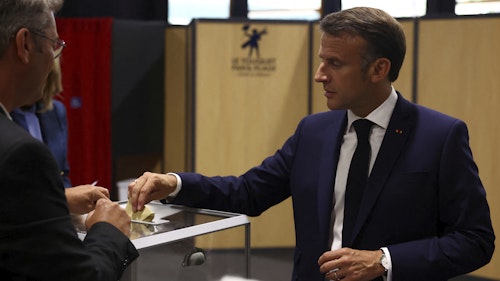
Macron votes in Le Touquet as his party faces tough night ahead
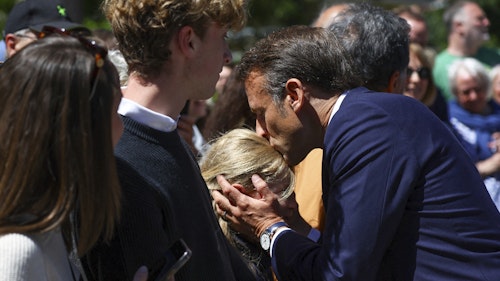
French President Emmanuel Macron cast his vote around 13.45 CET in the northern coastal French town of Le Touquet.
But the far-right National Rally (RN) party of Marine Le Pen is poised to crush Macron's Renaissance party by potentially securing over 30-32% to Macron's 15-16%. Whilst a RN victory would not be unprecedented (it came first in the last European election in 2019), it would be a historic landslide if RN secures a third of the French vote, as some polls predict.
Renaissance is also closely tailed by the Socialist Party, meaning Macron's party could come in at third place.
Crossing over to Germany - Chancellor Olaf Scholz is at the ballot box
Scholz is currently casting his vote in Berlin - now he has an important night ahead of him, with the vote framed as a referendum on his governing coalition of socialists, greens and liberals.
The centre-right opposition CDU/CSU stand head and shoulders above all other contenders in opinion polls. The parties in the ruling coalition are all expected to see their support stagnate or dip, with the Greens set to take the hardest hit as security and migration overtake climate among voters’ concerns.
The big test for Scholz will be whether his socialist SDP party manages to finish with a stronger result than the embattled far-right Alternative for Germany (AfD). AfD's support has recently dipped amid investigations into Chinese and Russian interference and its expulsion from its European political family after lead candidate Maximilian Krah made Nazi comments in the media. But some polls still put them neck and neck with Scholz's socialists.
The outgoing parliament's best moments
A lawsuit, the death of a president, a damning corruption scandal, and an MEP who escaped the police by sliding down a drainpipe.
These are just some of the defining moments of the outgoing European Parliament during the ninth term, narrated by my colleague Jorge Liboreiro.
The parliament also approved a staggering 467 legislative texts, leaving 119 draft proposals for the incoming parliament.
The 11 moments that defined the European Parliament’s term
The European Parliament has closed the last plenary session of its 9th term. #EuropeDecoded…
Another European lead candidate votes - this time, the Left's Walter Baier
While all eyes are on the far right, parties on the extreme left of the political spectrum are also set to make small gains.
The European Left chose Walter Baier of the Austrian Communist Party to front their campaign and run for the presidency of the European Commission. But Baier, a little-known politician, has struggled to cut through and virtually has no chance to have a shot at the top EU job.
In a recent interview with Euronews, Baier slammed von der Leyen's overtures to the far right and blamed mainstream parties for allowing the far right to flourish.
President and lead candidate of the @europeanleft, @WalterBaierEL, voted this morning in his hometown in Vienna in the #EUElections2024.
— European Left (@europeanleft) June 9, 2024
Do not forget to vote left! pic.twitter.com/Wwf2xaF6FT
Maltese prime minister claims victory for Labour party, despite razor-thin advantage
Speaking on Maltese channel TVM, the country's prime minister Robert Abela claimed a "solid victory" for his left-leaning Labour party.
Maltese media meanwhile report that Labour party secretary-general Michael Piccinino had said the party's lead over the opposition Nationalist Party had reduced to just 15,000 votes.
Provisional estimates by poll aggregator Europe Elects finds that Malta's six seats will be split equally between the Labour Party and the Nationalist Party.
Jordan Bardella poses for photos with fans as he votes in Paris
National Rally (RN) leader Jordan Bardella posed for selfies with supporters as he cast his vote in a Paris suburb.
Speaking to reporters at the ballot box, Bardella simply said: "See you this evening."
Some polls estimate his party could gain as much as 30-32% of the vote in France, and clinch around 28 of France's 81 seats in the European Parliament.
Bardella has consolidated his party's growth with slick performances in televised debates and strategic campaigning on social media platforms such as TikTok, as he appeals to France's new wave of young voters.
With the National Rally aiming to challenge President Emmanuel Macron in the upcoming 2027 presidential election, much is at stake in France in these EU elections.
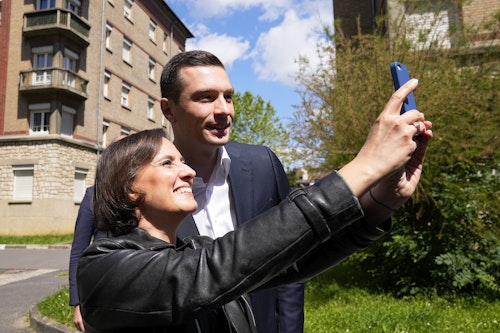
Raphael Glucksmann, lead candidate for France's Socialists casts his vote
Glucksmann, 44, has campaigned for a more "sovereign", "powerful" and "ecological" EU with proposals including common debt to ramp up the bloc's defence, the establishment of a minimum income across the 27 member states and a tax on the income of the Union's highest earners and corporations.
Projected to come in third, he has been steadily gaining momentum in the polls over the past month and could create the surprise by supplanting President Emmanuel Macron's centrist Renaissance party for the second place.
À voté 🗳️
— Raphael Glucksmann (@rglucks1) June 9, 2024
Vive la démocratie et vive l’Europe ! pic.twitter.com/n1dq6J2Q3G
Von der Leyen asks voters to make 'our common home' stronger
"Home" has been a red thread in Ursula von der Leyen's re-election campaign.
She's vowed to strengthen European democracy, ensure prosperity and bolster Europe's defences.
Technically, no one in the EU can vote for her, but the result should impact her chances of securing a second term as the president of the European Commission.
After voting in her native Germany, von der Leyen said on social media platform X: "Let’s make Europe, our common home, stronger than ever."
I have just voted 🗳️
— Ursula von der Leyen (@vonderleyen_epp) June 9, 2024
Head to the polls and #UseYourVote
Let’s show the power of our democracy.
Let’s make Europe, our common home, stronger than ever. pic.twitter.com/KuPVo707SD
Traditional abstainer Slovakia on track to break turnout record
In the last European election in 2019, just 22.74% of voters in Slovakia headed to the polls, the lowest in any EU member state.
This time, Slovak media reports turnout could reach a record high of 33%. While still low, it indicates interest in the EU vote could finally be on the rise in the Eastern country.
Macron's top pick at the ballot box
Valérie Hayer is leading the French list of President Emmanuel Macron's Renaissance party, and is also one of a trio of lead European candidates fielded by the liberal Renew Europe group.
Hayer has had the task of facing off the National Rally's Jordan Bardella - who has garnered the support of around a third of the French electorate - in televised debates in France. She was interrupted on live radio by the country's prime minister, Gabriel Attal, last Thursday as Macron's camp ramped up efforts to dent the far-right's support and regain the trust of its traditional voter base.
Hayer's European liberal group could see its seat allocation slip significantly. It is also expected to expel the Dutch People's Party for Freedom and Democracy (VVD) tomorrow in response to the deal it has struck with Geert Wilders' far-right Party for Freedom (PVV) to form a new government in the Netherlands.
A voté !
— Valérie Hayer (@ValerieHayer) June 9, 2024
Merci à tous les présidents de bureaux de vote, tous les assesseurs, tous les scrutateurs mobilisés pour ces élections européennes.
🗳️ pic.twitter.com/6jGdA3rB4R
Belgian royal adolescents vote
The teen children of King Philippe and Queen Mathilde of the Belgians voted for the first time in elections on Sunday.
Princess Elisabeth, Prince Gabriël, Prince Emmanuel and Princess Eléonore - aged between 16 and 22 - all cast their vote for the first time this morning in Laeken, in the north of Brussels.
Their parents didn’t vote, as it is tradition, to maintain their neutral position as Head of State.
Belgium is always one of the countries with the highest turnout in the European elections with last year's participation reaching 88.47%, higher than the EU average of 50.66%. This high turnout may be because voting is compulsory in Belgium.
As of these European elections, citizens can vote from the age of 16 which is also expected to increase participation.
Those who don't participate in the electoral process can face a fine and if they fail to cast a ballot in four elections within a 15- year period could lose the right to vote.
Belgians also vote today for the municipal and federal elections.
Plus de 800.000 jeunes 🇧🇪 sont appelés aux urnes aujourd’hui pour la première fois !
— Belgian Royal Palace (@MonarchieBe) June 9, 2024
🗳️ C’est le cas notamment de la Princesse Elisabeth, du Prince Gabriel, du Prince Emmanuel et de la Princesse Eléonore, à Laeken. pic.twitter.com/hZ1Dm1qrl5
Schmit - the man who's challenging his boss to the Commission helm
He's the Party of European Socialists' lead candidate to be the next European Commission chief - but in reality, Nicolas Schmit has little to no chance of securing the job.
The little-known Luxembourgish politician works for von der Leyen's Commission, spearheading the jobs and social rights directorate. But he's spent the past few weeks slowly mounting an opposition campaign to von der Leyen's re-election bid.
In an interview with Euronews, he censored von der Leyen's migration deals with autocratic third countries such as Tunisia, saying such deals need to be re-opened and revised.
Schmit cast his vote this morning in Luxembourg.
Go V O T E 🇪🇺🌹#social #democratic #sustainable pic.twitter.com/OCM9eoZq9F
— Nicolas Schmit, PES lead candidate (@NSchmitPES) June 9, 2024
Early estimates suggest liberal Progressive Slovakia (PS) has narrowly edged PM Robert Fico's Smer party
Poll aggregator Europe Elects - citing Slovak daily Denník N - says the social-liberal Progressive Slovakia (PS) party has pipped Prime Minister Robert Fico's populist Smer party to narrow victory.
The results are expected to be confirmed later tonight.
On May 15, an attempted assassination attempt on prime minister Robert Fico rocked the nation, with campaigning events temporarily suspended. Fico voted from hospital in the capital of Bratislava yesterday.
Since Fico returned to the post of prime minister last October, the political and media landscape in Slovakia has become extremely polarised amid Fico's attempts to stifle the independent public media and abolish a special prosecutor’s office - raising alarm bells also in Brussels.
Slovakia, European Parliament election:
— Europe Elects (@EuropeElects) June 9, 2024
Unofficial results (as per Denník N, based on reports from political parties)
PS-RE: 28% (+8)
Smer-NI: 25% (+9)
Republika-NI: 13% (new)
Hlas~NI: 7% (new)
KDH-EPP: 7% (-3)
SaS-ECR: 5% (-5)
D-EPP: 5% (n.a.)
MA-EPP: 4% (-1)
S/ZĽ-EPP: 2% (-3)… pic.twitter.com/W0AziizKzU
Ursula von der Leyen votes as her future hinges on the ballot
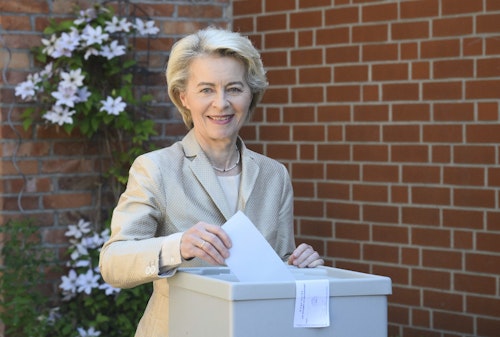
Casting her vote in Hannover, Germany, Ursula von der Leyen left with a mere 'danke schön' to reporters.
Her future at the helm of the European Commission, the EU's powerful executive arm, hinges in principle on the outcome of the vote. Von der Leyen is the top pick of the centre-right European People's Party (EPP) for the Commission presidency, and should therefore get the first shot at securing the job as the EPP is more than less guaranteed to win the election.
But von der Leyen's future is far from secure. She will need the backing of an absolute majority of the newly-elected 720 Members of the European Parliament (MEPs) to clinch the job - and with traditional parties seeing their support stagnate, she might struggle to secure the numbers.
That's seen as one of the reasons why she's been cosying up to leaders further to the right of the political spectrum, such as Giorgia Meloni and her hard-right Brothers of Italy (FdI) party. But these overtures have also sparked the ire of her centrist and left-leaning counterparts.
EU leaders could also in principle nominate a completely new candidate to the role of Commission chief, meaning all is still to play for in the race to the top job in Brussels.
Greens' top candidate Terry Reintke votes
She's one of two candidates fielded by the Greens for the top job in Brussels, the chief of the European Commission.
But her European party could be one of the biggest losers of the night, with opinion polls suggesting support for the Greens is in decline in all corners of Europe. They were the big winners back in 2019, in the aftermath of mass climate demonstrations.
But since then, scepticism around the European Green Deal and its knock-on effects on European livelihoods has triggered a backlash against climate policies.
Speaking to Euronews in May, Reintke pitched her party as the antidote to "right-wing, authoritarian" forces that are trying to water down climate action.
Ich habe gewählt.
— Terry Reintke (@TerryReintke) June 9, 2024
Immer noch jedes Mal ein wahnsinnig schöner Moment für mich.
Diese Wahlen entscheiden über unsere gemeinsame Zukunft in Europa.
Deshalb:
GEHT WÄHLEN.
WÄHLT DEMOKRATISCH.
UND AM BESTEN @Die_Gruenen
🇪🇺✨💚 pic.twitter.com/txCiYiIGen
Pedro Sánchez: Elections of 'enormous importance' for Spain's future
Casting his vote in Madrid, Pedro Sánchez called on Spanish voters to decide "what future we want for Europe."
"I call on everyone to participate and together decide what future we want for Europe, whether we want progress or regression, whether we want a Europe of solidarity or a reactionary Europe," the prime minister said.
Less than seven months after he clinched a second term as prime minister by striking a controversial amnesty deal with Catalan separatists, many polls put Pedro Sánchez’s socialists neck and neck with the centre-right opposition, the Popular Party (PP).
PP is hoping to capitalise on its traditional voters' discontent around the amnesty law as well as a judicial probe into Sánchez’s wife Begoña Gómez. The PP could also capture the past vote of the centrist Citizens (Ciudadanos) party, which is predicted to lose all of its 9 seats.
Los ciudadanos y ciudadanas han percibido la importancia de las elecciones europeas que, para el futuro de España es de enorme importancia.
— PSOE (@PSOE) June 9, 2024
Llamo a la participación a todo el mundo y entre todos decidir que futuro queremos para Europa, si uno de avances u otro de retroceso, si… pic.twitter.com/3Y2jHGXFbd
Marine Le Pen casts vote as polls predict a historic show for her far-right party
Opinion polls predict Marine Le Pen's far-right National Rally (RN) could make history tonight by breaking 30% of the vote in France.
A victory for her party in the European elections would not be unprecedented - National Rally topped the poll back in 2019, securing 24.86% of the vote.
But this time, her party is on track to double the vote of President Emmanuel Macron's Renaissance party, propelled by a surge in support under the leadership of her 28-year-old protégé Jordan Bardella. This could mean that National Rally will send more lawmakers to Brussels than any other party anywhere in Europe.
Bardella has tried to use his campaign to prepare the ground for what will likely be Le Pen’s last bid to become president in the upcoming 2027 French presidential election.
It means a headache for President Emmanuel Macron and his liberal Renaissance party, which has progressively plummeted in the polls and could even finish third if socialist wildcard Raphaël Glucksmann sees a last-minute uptick in support.
Le Pen has also floated a potential alliance between her European political family - Identity and Democracy (ID) - and Giorgia Meloni's European Conservatives and Reformists (ECR), a move designed to unite the European Parliament's fragmented right-wing forces.
A voté. pic.twitter.com/Yh6yHkNMw6
— Marine Le Pen (@MLP_officiel) June 9, 2024
Hungarian prime minister Viktor Orbán and challenger Péter Magyar vote in Budapest
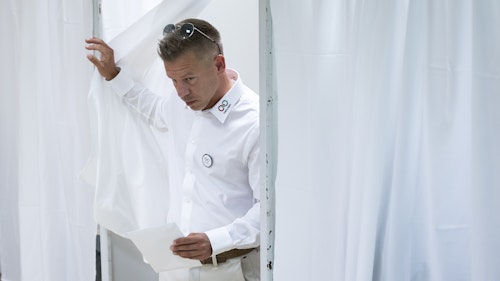
AP reports that Orbán and his ally-turned-opponent Péter Magyar have both cast their votes in the Hungarian capital of Budapest.
Orbán said: "Now the question is whether Europe should go to war and people can have their say on this."
The Hungarian premier has attempted to frame the vote as a choice between peace and war, claiming that the bloc is being dragged into a conflict with Putin's Russia by throwing its weight behind Ukraine.
Magyar, a former government insider who shocked the nation in March when he spoke out against the ruling class's corruption and propaganda machine, said: "We need a real change of system in Hungary. I urge voters not to be afraid, and go and vote"
"I expect that Hungarians send a strong message that enough is enough," he added.
Magyar, also a conservative, mobilised tens of thousands of supporters in Budapest on the eve of the election on Saturday in a bid to rally Hungarians against the decade-long dominance of Orbán and his hardline, nationalist Fidesz party.
European Liberals' lead candidate casts vote
She's a little-known face outside Germany, but Marie-Agnes Strack-Zimmermann is one of the liberal Renew Europe group's three lead candidates vying to become the next president of the European Commission.
She represents the liberal Free Democratic Party (FDP), which is part of Germany's so-called traffic light coalition of socialists, greens and liberals. The party has notoriously attempted to derail key EU climate bills.
Euronews sat down with her in Maastricht back in April, when she blasted the policies of Ursula von der Leyen, the sitting president of the European Commission, in the fields of defence, economy and fundamental rights, including her executive failure to provide one million rounds of artillery shells by March 2024 as promised.
Heute bitte ich um Ihre Stimme für die @fdp, denn bei der #Europawahl geht es um viel. Unsere Aufgabe ist es, Freiheit & Wohlstand für kommende Generationen zu erhalten. Wir stärken die europäische Wirtschaft & Sicherheit, denn #Europa ist unsere Zukunft. Gehen Sie bitte wählen. pic.twitter.com/MaqzHgmnSy
— Marie-Agnes Strack-Zimmermann (@MAStrackZi) June 9, 2024
What is the election really about in your country?
The European elections are sometimes described as 27 mini-elections driven by national issues.
In many member states, the vote has been framed as a referendum on national governments, with campaigns shaped more by domestic issues than European ones.
Euronews' correspondents breaks down what's at stake in key national battlegrounds as Europe goes to the polls.
European elections: Your country-by-country guide to the vote
Euronews’ correspondents break down what’s at stake in the major national battlegrounds as voters prepare to head to the polls. #EuropeNews…
Turnout at historic lows in French overseas territories
Yesterday, voters cast their ballots more than 15,000 km away from Brussels, in the French overseas territories of Martinique, Guadeloupe, French Guiana, Saint-Martin, Saint Pierre and Miquelon and French Polynesia.
French media report this morning that turnout was at a historic low at 17.00 local time in the Antilles islands of the Caribbean.
In Guyane, just over 13% of voters were estimated to have voted.
That figure stood at just 8% in Martinique, and 11% in Guadeloupe.
Turnout in Malta estimated at 72.8%
An estimated 72.8% of eligible voters turned out yesterday in the EU's smallest country, Malta, according to poll aggregator Europe Elects.
If confirmed, it would be a slight increase on last election's turnout in 2019, but still a slump compared to other European elections over the past two decades.
Malta elects just 6 members to the European Parliament, the smallest representation along with the only other island state, Cyprus.
Malta, European Parliament electoral history:
— Europe Elects (@EuropeElects) June 9, 2024
Final turnout:
2004: 82.4%
2009: 78.8%
2014: 74.8%
2019: 72.7%
2024: 72.8% (estimate)
Source: Electoral Commission of Malta#EP2024 #EUelections2024 #Malta pic.twitter.com/1BKRA4kBgZ
Good morning and brace yourselves for a marathon election day
This is Mared Gwyn Jones, Euronews’ reporter bringing you all the latest from Euronews’ HQ in Brussels.
Our team of reporters across Europe will be bringing you the latest developments throughout the day, as they happen, before our special live election programme kicks off live at 17.00 CET.
21 countries head to the polls today, and here's when polling stations open in each country:
6am - Hungary
7am - Austria, Bulgaria, Croatia, Cyprus, Greece, Italy, Poland, Romania, Slovenia
8am - Belgium, France, Germany, Lithuania, Luxembourg, Portugal
9am - Denmark, Estonia, Finland, Spain, Sweden

